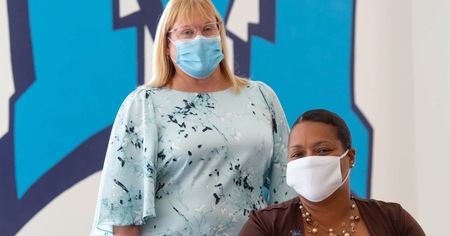Never have we seen such a disruption to "business as usual." As we consider the ways to mitigate impacts for our young people, I hope we will include staff in the conversation.
Because most afterschool line staff are young adults, it's critical for managers and supervisors to understand that over the past five months, 18-to-26-year-olds have not only experienced a life disruption, but also a developmental disruption. Young adulthood is a time for testing independence and developing a sense of self, trying out adult roles including first jobs and potential careers, and exploring and developing close, committed, and intimate relationships with others.
The COVID-19 pandemic has significantly disrupted this life phase by forcing isolation, disrupting education and employment, minimizing opportunities and spaces for identity formation and exploration and, in many cases, seizing financial, emotional, and even bodily independence from young adults who were just beginning to find their place in the world. Add to this the additional trauma for People of Color after a slew of murders at the hands of law enforcement this spring, and we have a perfect storm that will almost certainly have major impacts on our out-of-school time workforce.
We must remember that every person will emerge from the pandemic different than they were before. You might notice profound differences in engagement, commitment, creativity, preparedness, relationships and innovation. Given the level of physical, emotional, and developmental disruption we have faced, this is normal and it will take time—potentially many months or even years—to get to a place where basic physiological and safety needs are not the priority.
Leaders within the afterschool field should not try to rush it, and should instead focus on building staff development programs that meet human beings where and as they are—even if they aren't where we want or need them to be. This does not mean excusing bad behavior or unprofessionalism, but it does mean reimagining staff development programs through a more trauma-informed, strengths-based, and healing-centered lens. Applying social-emotional learning (SEL) principles is a good start. Yet to truly prioritize staff development this year, we encourage leaders, programs and organizations to adopt a holistic approach with six practices at the core.
Consider the social and emotional competence of your systems.
Oftentimes, when discussing SEL, we focus on individuals acting and using skills within systems. Right now, it would be helpful to instead focus on building systems that support individuals. Consider the five core SEL skills—self-awareness, self-management, responsible decision-making, relationship skills, social awareness—and how skillful your organization or program is at applying these skills. Do your policies and practices center relationships? Do your systems take current social dynamics into account? Are decisions made responsibly and perceived as such? By making tweaks to the systems in which human beings operate, we will be more prepared to support, nurture and develop our staff.
Build community and relationships first.
When I was an afterschool program director, my favorite parts of the day were the 30 minutes before program started and the 30 minutes after it ended. I loved hearing my staff coming in and genuinely enjoying each other's company. I have experienced this in countless other programs at this point as well. Unfortunately, COVID-19 has forced us to give up the natural and casual interactions that allow us to build relationships, cultivate trust, and create community. Therefore, it is more important than ever to begin our staff development strategy here. Consider:
- How can you replicate "water cooler" moments in a virtual setting?
- How do you let people know that they are a part of a community?
- How can you intentionally set aside time for relationship building with individuals and groups?
Prioritize meaningful professional development.
Because so many of our staff's education, employment and career trajectories have been disrupted, professional development is critical. The trick is to make this professional development meaningful, relevant and a part of what you do rather than an add-on. Spend time this summer creating a professional development calendar not only for your program but also for the unique needs of staff within your program. That extra investment in coaching, workshops, or leadership development will go a long way in showing your people that you see them and care about their future and career.
Center positive young adult development.
Have honest discussions with staff about where they have been and how this crazy period has impacted them. Then, take proactive and responsive steps to nurture the parts of people's development that may have been disrupted. For example: Consider how you can give more autonomy to people who feel like they have lost their independence. Or consider how you might set up internal mentoring systems for people whose relationships have been impacted by COVID-19. By centering positive young adult development for staff in the same way that we center positive youth development for young people, we can create more inclusive systems where our staff can heal and thrive.
Create and give space for listening, healing, human connection, and joy.
The impacts of COVID-19 are far from over and we cannot try to pick up where we left off. Sometimes, the most powerful thing we can do as leaders is to create spaces that are not tied to job responsibilities or outcomes. When reimagining your staff development systems, consider how to provide these opportunities in the long term.
Develop staff with HEART.
No matter what happens in the next several months, successful staff development relies on the HEART of your organization or program—Humanity, Empathy, Authenticity, Relationships, Trust. The more HEART you have, the stronger your staff engagement and development will be. And when these values are lacking, it will be more apparent and harmful to your team now than it was before we all experienced a collective trauma. When we take steps to become more HEART-healthy leaders and programs, we see dramatic results for the people we are privileged to lead.
Reimagining staff development in the wake of the COVID-19 pandemic requires us to think purposefully about our staff and their unique needs in an unprecedented time.
Reloveution offers resources, programs, and tools that help leaders and organizations learn and embody the practices above, and we hope that you will become involved in our movement to transform the world of work through the power of love, compassion, and humanity.
Learn more at www.truerelovetion.com, follow along on social media at @truereloveution, or reach out to me directly at Marissa@truereloveution.com. We're cheering you on and would love to partner with you to create meaningful change!
Marissa Badgley, MSW, is the Founder of Reloveution and is on a mission to transform the world of work through the power of compassion and humanity. She is also an NAA Advocate Member.



